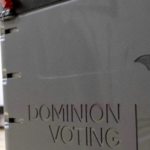
Former President Barack Obama has called for “digital fingerprints” to be mandatory online to help authorities censor so-called “misinformation.”
In a new interview, Obama suggested the development of new technology to track and identify people online to combat “disinformation.”
He argues that such a move would help to remove “misleading” news from the Internet and provide consumers with only “true” information.
Obama sat down with his former White House senior adviser David Axelrod for a conversation on the latter’s podcast, “The Axe Files,” on CNN Audio.
During the interview, Axelrod noted he’s seen “misinformation, disinformation, [and] deepfakes” targeting Obama.
“As I’ve told people, because I was the first digital president when I left office, I was probably the most recorded filmed photographed human in history, which is kind of a weird thing,” responded Obama.
“But just the odds are that I was.
“As a consequence, there’s a lot of raw material there.”
Obama added that the deepfakes — digitally manipulated images, audio, or video that appear almost legitimate — started with a version of him dancing, “saying dirty limericks,” or similar kinds of activity.
“That technology’s here now,” continued Obama.
He then warned about the issue getting worse moving forward.
“So, most immediately we’re going to have all the problems we had with misinformation before, [but] this next election cycle will be worse.”
Obama then suggested “digital fingerprints” to discern truth from misinformation.
“And the need for us, for the general public, I think to be more discriminating consumers of news and information, the need for us to overtime develop technologies to create watermarks or digital fingerprints so we know what is true and what is not true,” he said.
“There’s a whole bunch of work that’s going to have to be done there, but in the short term, it’s really going to be up to the American people to kind of say.”
Obama and Axelrod went on to say that today many consumers are only viewing information from sources they are predisposed to agree with and will likely believe what they see.
“Obviously, we saw that during the vaccination stuff,” added Obama, referring to Covid shots.
The interview came about six weeks after the Obama Foundation on World Press Freedom Day posted a recent video of the former president lecturing about “widespread disinformation” and the need for journalists to create “an information environment” to support democracy.
Last year, Obama announced that his foundation would be launching a new initiative to combat misinformation.
Days later, Obama angered conservatives with a speech at Stanford University warning of the dangers of “disinformation.”
During the speech, Obama said, “All we see is a constant feed of content where useful factual information and happy diversions, and cat videos flow alongside lies, conspiracy theories, junk science, quackery, white supremacist, racist tracts, misogynist screeds.”
Critics were quick to point out that Obama promoted the debunked narrative that President Donald Trump colluded with Russia to win the 2016 election.
Obama infamously won Politifact’s “Lie of the Year” in 2013 by telling Americans, “If you like your health care plan, you can keep it,” referring to the Affordable Care Act.
More recently, Democrat President Joe Biden’s administration came under fire for trying to start the now-defunct Disinformation Governance Board under the Department of Homeland Security.
Conservatives argued such an initiative would act as a Ministry of Truth in a dystopian society by suppressing free speech and dissent under the guise of stopping “misinformation.”



